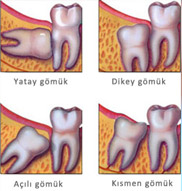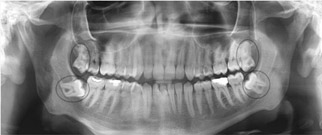WISDOM TEETH

What Are Wisdom Teeth?
The last teeth to emerge in the mouth are the third molars, also known as wisdom teeth. There are a total of four wisdom teeth, two on each side of the jaws. Wisdom teeth typically emerge between the ages of 14 and 25.
Why Are Wisdom Teeth Harder to Erupt?
When there is insufficient space in the jawbone or the tooth development cannot progress along with the growth of the jaw, wisdom teeth may erupt with difficulty or remain impacted.
Why Do Lower Jaw Wisdom Teeth Take Longer to Erupt?
The bud where the wisdom tooth develops is located behind the second molar and is often tilted. As growth and development occur, the size of the jawbone increases, especially the rear part. If the wisdom tooth is in a horizontal position, it cannot erupt properly.
The age of 18 is considered the time when wisdom teeth start to erupt. The growth of the lower jaw completes around age 18. Since the tooth cannot penetrate the dense and hard bone tissue, it fails to erupt.
If there is not enough space between the horizontal and vertical parts of the lower jaw, or behind the second molar, this is also considered a reason for difficult eruption.
Do Wisdom Teeth Have to Be Extracted?
If wisdom teeth erupt correctly without damaging surrounding tissues, they do not need to be removed. After your dentist's X-ray evaluation, infected teeth fused with the jawbone or teeth causing orthodontic problems should be carefully assessed, and extraction should be decided by considering all possible complications.
Wisdom teeth that are impacted must be regularly monitored. Treatment methods may vary from patient to patient. Your dentist will plan the best treatment method for you.
When Are Wisdom Teeth Dangerous?
Caries: Due to the position of wisdom teeth, decay may occur in the wisdom tooth itself or the adjacent teeth.
Gum Infection: When wisdom teeth do not fully erupt, food debris and bacteria accumulate around the gum tissue near the wisdom teeth causing multiple infections. Symptoms such as bad breath, pain, facial swelling, and limited mouth opening may occur. The infection can spread to the cheek and neck via lymph nodes, leading to serious complications.
Pressure Pain: Pressure from wisdom teeth on adjacent teeth may cause pain. Some patients may experience wear on neighboring teeth.
Orthodontics: Many young patients require orthodontic treatment to correct crowded teeth. Wisdom teeth can worsen crowding due to lack of space.
Prosthetics: In patients with complete dentures, impacted wisdom teeth can cause misfit, sore spots, and usability problems with the prosthesis.
Cyst Formation: Cysts can form on the soft tissue surrounding impacted or partially impacted wisdom teeth. Removal of these teeth and cysts is crucial to prevent future damage to bone and adjacent teeth. In some cases, tumors may develop inside the cyst or cyst enlargement may cause jaw fractures.
Should a Wisdom Tooth in a Bad Position Be Extracted Even If It Doesn't Cause Visible Problems?
A poor position alone, even without visible issues, is enough reason for extraction to prevent infection.
Wisdom teeth are located in areas difficult to reach with brushing or flossing. Bacteria, acids, and food debris accumulate here, causing discomfort. If decay is not treated, inflammation develops rapidly. This buildup also causes bad breath.
An impacted wisdom tooth lying horizontally under the gums exerts pressure due to movement and crowding of other teeth. Bacteria accumulating under the gum tissue covering the impacted tooth cause gum infections as well.

When Is the Best Time to Extract Wisdom Teeth?
Impacted teeth should be extracted between ages 16 and 22 whether or not they cause symptoms. Procedures performed during youth are technically easier and healing is faster. Extraction becomes more difficult and healing slower with age due to decreased tissue flexibility.
Can a Tooth Be Extracted During an Acute Infection?
If intervention is made during infection, the infection can spread and healing will be slower and more difficult. Infection can be controlled with local oral hygiene, antibiotics, and sometimes extraction of the wisdom tooth in the opposite jaw.
How Does Healing Progress After Extraction?
Swelling, pain, bleeding, and bruising are normal after extraction. Difficulty opening the mouth may occur. Symptoms usually resolve within a week. Applying cold compresses to the area can relieve discomfort.
Post-Operation Instructions
• Bite down on the gauze placed in the operation area for about 30 minutes to keep it in place.
• Do not eat or drink for at least 2 hours after the procedure.
• Do not spit or rinse your mouth for 24 hours after removing the gauze. Spitting creates suction that can cause bleeding and delay healing.
• Avoid smoking for 24 hours after extraction. Smoking delays healing and increases infection risk.
• Do not consume alcoholic or acidic beverages before and after the operation.
• Do not brush the treated area on the day of and the day after surgery.
• Resume normal brushing after 2 days, but keep the operation site clean.
• Avoid hot showers, foods, and drinks for 24 hours after surgery.
• If you experience pain, take painkillers other than aspirin (aspirin can increase bleeding).
• If approved by your dentist, apply cold compresses to the area.
• Sleep with your head elevated.
• Return to have stitches removed one week after surgery. If bleeding occurs, contact the clinic immediately.
• Do not neglect prescribed medications.
• Contact the clinic if unexpected symptoms occur (such as prolonged pain or bleeding).







